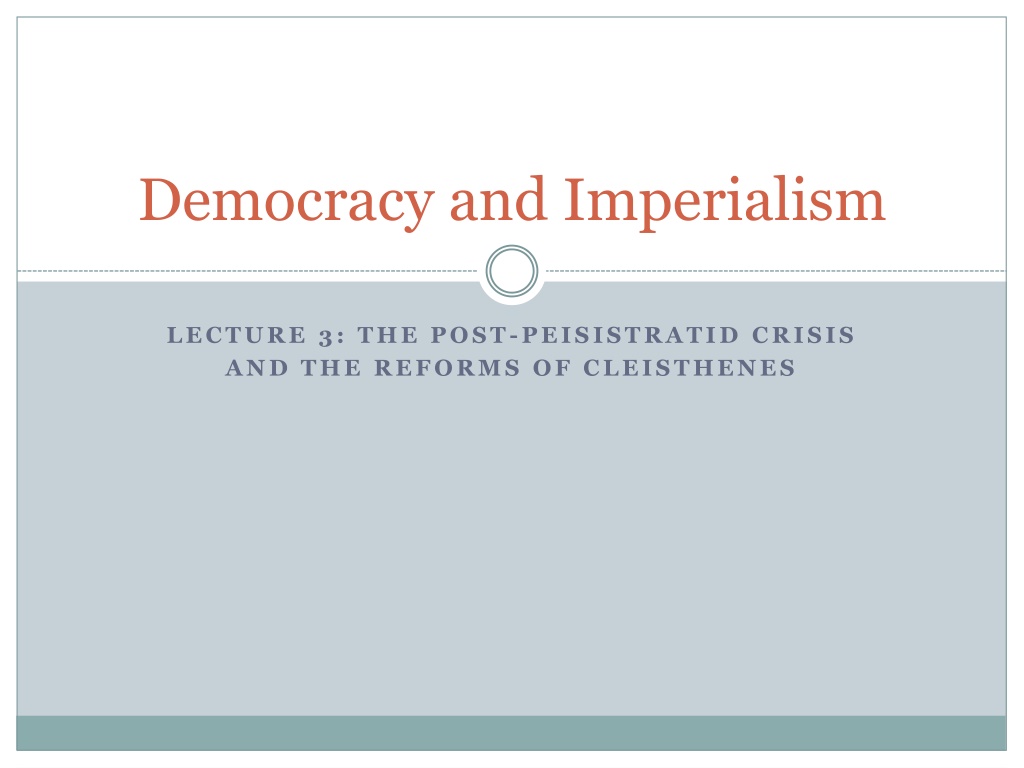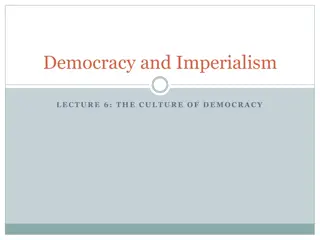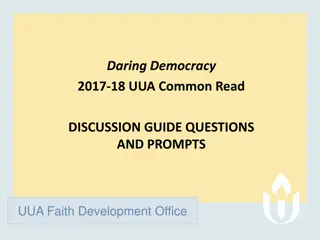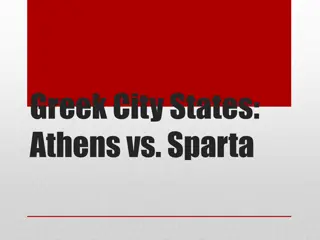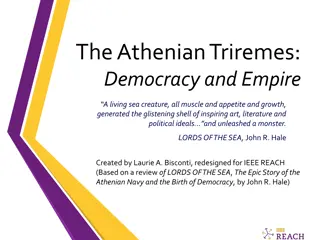Athenian Democracy: Post-Peisistratid Crisis and Cleisthenes's Reforms
After the rule of Peisistratus, Athens faced a crisis that led to the reforms of Cleisthenes. Solon's reforms had set a foundation, but tensions remained between rich and poor. The Solonic constitution established a system involving magistrates, the Areopagus Council, and the Assembly. The interplay of oligarchic, aristocratic, and democratic elements shaped Athens in the early 6th century BC until events such as the fall of Hippias altered the political landscape.
Download Presentation

Please find below an Image/Link to download the presentation.
The content on the website is provided AS IS for your information and personal use only. It may not be sold, licensed, or shared on other websites without obtaining consent from the author. Download presentation by click this link. If you encounter any issues during the download, it is possible that the publisher has removed the file from their server.
E N D
Presentation Transcript
Democracy and Imperialism LECTURE 3: THE POST-PEISISTRATID CRISIS AND THE REFORMS OF CLEISTHENES
Previously on Democracy and Imperialism Leisure-class rivalries and tension between rich and poor necessitate reforms Solon abolishes debt bondage, redefines citizen status & social stratification through property classes, introduces popular court Faction continues; Peisistratus becomes tyrant Solon s laws preserved; Athens flourishes, stabilised by Peisistratus conciliatory politics & stimulated by his competitive patronage 527: Peisistratus dies, Hippias becomes tyrant
The Solonic constitution Nine Archons and other magistrates (treasurers, public auctioneers) selected from highest property classes Ex-Archons join Areopagus Council, which writes laws and speaks justice Council (?) runs everyday affairs, sets agenda of the Assembly Assembly acts as court of appeal, can impeach magistrates
Key questions Is Athens c. 520 different from other Greek states? Is the Solonic system a democracy? What is needed to make it a democracy?
Aristotle on Solons laws As for Solon, he is considered by some people to have been a good lawgiver, as having put an end to oligarchy when it was too unqualified, and having liberated the people from slavery and restored the ancestral democracy with a skilful blending of the constitution: the Council on the Areopagus being an oligarchic element, the elective magistracies aristocratic, and the law-courts democratic. Politics 1273b.35-42 Solon, for his part, appears to bestow only the minimum of power upon the people, the function of electing the magistrates and of calling them to account (for if even this were not under the control of the populace it would be a mere slave and a foreign enemy), whereas he appointed all the offices from the well- born and the rich. Politics 1274a.15-19
The end of Hippias, part 1: the tyrant-slayers Hippias brother Hipparchus falls in love with Harmodius, who is already the beloved of Aristogeiton Enraged, Hipparchus humiliates Harmodius younger sister Harmodius and Aristogeiton plot to kill Hippias and Hipparchus Fearing betrayal, they attack early and alone, killing only Hipparchus (514)
The tyrant-slayers celebrated You two will always have renown throughout the world Dearest Harmodius and Aristogeiton, Because the two of them slew the tyrant And made Athens a city of isonomia (equal rights) Athenaeus 15.50 (drinking song for the tyrant slayers) There shall be public maintenance in the prytaneion, first for [ ] in accordance with ancestral custom, then the descendants of Harm[odius and Aristogei]ton, whoever is nearest in descent, if there are no legitimate sons, shall have public maintenance. IG I3 131, lines 3-8
When tyranny became a bad word After this the Athenians were subject for four years to a tyranny not less but even more absolute than before. Herodotus 5.55 After this the tyranny pressed harder on the Athenians, and Hippias, now grown more fearful, put to death many of the citizens, and at the same time began to turn his eyes abroad for a refuge in case of revolution. Thucydides 6.59.2 After this it began to come about that the tyranny was much harsher; for Hippias's numerous executions and sentences of exile in revenge for his brother led to his being suspicious of everybody and embittered. [Aristotle] Ath. Pol. 19.1
The end of Hippias, part 2: the Spartans Alcmeonids, in exile at Delphi, bribe the Oracle to tell the Spartans to liberate Athens Spartans send an army by ship to Phaleron to march on Athens and depose Hippias Spartans send king Cleomenes with a bigger army; Hippias besieged on the Acropolis; surrender and exile of the Peisistratids (510)
A clear road to democracy? There were two men of greatest power: Cleisthenes, an Alcmeonid (the one who allegedly bribed the Pythia), and Isagoras son of Teisander, a man of a great house, though of what ancestry I cannot say. ( ) These men with their factions started competing for power, and Cleisthenes, being the weaker, brought the people into his faction. Herodotus 5.66.1-2 Cleisthenes attached the people to his cause by proposing to give power to the masses. [Aristotle] Ath. Pol. 20.1
Cleisthenes vs Isagoras Threatened by Cleisthenes popular support, Isagoras calls on Cleomenes to intervene (508) Cleomenes demands that Athens drive out the curse; Cleisthenes exiled Further Spartan-backed purification involves exile of 700 families opposed to Isagoras Cleomenes tries to dissolve the Council
Was democracy doomed? What forces put Athens back on the path to tyranny immediately after the exile of Hippias? What was needed to stop this from happening?
The revolution of 508 Council refuses to disband. Cleomenes and Isagoras occupy Acropolis The rest of the Athenians besiege the Acropolis until Isagoras surrenders (Hdt. 5.72.2) Athenians recall Cleisthenes and the 700 families from exile Cleisthenes appointed as reformer of the laws
The reforms of Cleisthenes Regrouping of 4 tribes into 10, named after Athenian heroes Each tribe composed of 3 trittyes( thirds ) selected by lot one urban, one inland, one coastal. Each third made up of several demes (139 total), the citizen s basic community Each tribe to contribute 50 councillors to new Council of 500 and 1 general to new board of 10 elected generals
The purpose of Cleisthenes reforms What do Cleisthenes reforms achieve? Why dissolve existing tribal affiliations? Why all the randomisation (formation of tribes, allotment of magistracies)? Introduction of ostracism why?
The father of democracy? Cleisthenes gave the Athenians their tribes and their democracy. Hdt. 6.131.1 (earliest known use of the word demokratia) Is this democracy? If so, was it intentional? Cleisthenes: champion of the people or Alcmeonid schemer?
The war for democracy (507/6) Cleomenes raises the army of the Peloponnesian League to install Isagoras as tyrant (4th Spartan invasion of Attica) Boeotians and Chalkidians attack at the same time Sparta s allies mutiny; Cleomenes forced to retreat; Athens defeats Boeotians and Chalkidians in battle
The power of democracy So the Athenians grew in power and proved, not in one respect only but in all, that isegoria (equal right to speak) is a good thing. Evidence for this is the fact that while they were under tyrannical rulers, the Athenians were no better in war than any of their neighbours, yet once they got rid of their tyrants, they were by far the best of all. This, then, shows that while they were oppressed, they were, as men working for a master, cowardly, but when they were freed, each one was eager to achieve for himself. Herodotus 5.78
